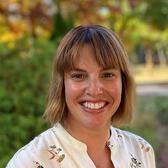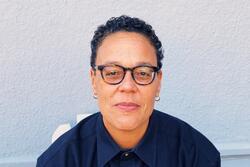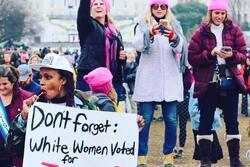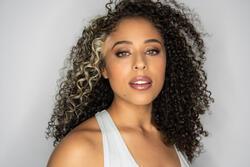7 Questions For April Baskin
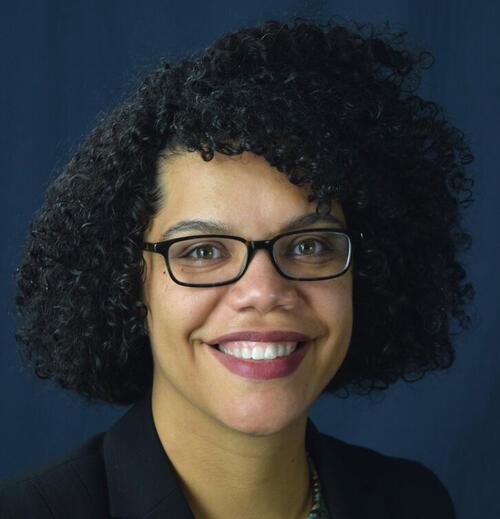
April Baskin (via joyousjustice.com)
JWA speaks with April Baskin, an organizer and founding director of Joyous Justice, which provides training and learning opportunities related to racial and social justice.
This interview has been edited for length and clarity.
JWA: You identify as a Black and Cherokee Jewish woman. Were each of these aspects of your identity part of your upbringing, and if so, how?
April Baskin: Yes, all three of these identities were a part of my upbringing in various ways. Since I present—or people often perceive me—as Black or multi-racial, this is the identity that I've most commonly been associated with. And then I was raised within the Jewish community. My parents were initially rejected by a couple of different communities, but they kept on pursuing belonging, and we landed at a wonderfully inclusive and quirky and just fantastic Reform Jewish community.
I have multiple Indigenous lineages [Cherokee, Chickasaw, and Choctaw]. But I'm already a multi-racial person and I have a multi-dimensional identity in other ways, so at times, I just lift up the Cherokee piece. But I have all three of those Indigenous lineages, and I was raised to know and be proud of and embrace the fact that I have Indigenous heritage. And this is the part of my identity that I've had to fight the most for, and also, in certain ways, had the harshest oppression. I experienced both targeting and oppression around all three aspects of my identity. But because of the nature and the long-standing impact of the attempted genocide of Indigenous peoples, I had the fewest resources or communal connections to Indigenous life, let alone the Indigenous life of specifically my lineage, since I was growing up in California.
JWA: Can you say a bit about the name "Joyous Justice"? With all the injustice in the world, it’s easy to sometimes feel less than joyous. Why did you decide to incorporate the idea of joy into the name of your organization?
AB: I did it because to me, joy can be the manifestation of spiritual power. The pre-conditions of joy for me are healing love, wholeness, alignment, integration, safety. Because there is so much injustice in the world and because of the pain it causes, joy can be a form of medicine, and it can also be a sign of progress. And to me, it helps to clarify what we're working toward, because I think it's important to incorporate our desired destination into our process. If we want to be in a world of collective liberation and regenerative economies and ways of living, to me part of that olam haba, that utopian collective liberation future that I'm working toward, is going to be a place where—not all the time, but often—joy is readily accessible.
JWA: Tell us about some of the programs and workshops you offer through Joyous Justice.
AB: Gladly! Right now I have two core offerings that are occurring on a rolling basis. One is that I have my Grounded & Growing year-long group coaching program that helps people to cultivate a trauma-informed leadership style and also helps them weave in success strategies, reduce stress, and start to live more joyously and justly on their terms. It's for busy, socially conscious professionals who want to be successful in their lives, want to help advance social justice, and do so without driving themselves into the ground.
And then to help give people a taste of what that year-long coaching experience is like and also to understand some of the core insights and frameworks that that program is built upon, we offer a free workshop periodically that we previously called Roadmap to Resilience, but we're revamping it a bit. It’s called Redefining Resilience, which I think is more apt for what we're endeavoring to do here. There's this sense that resilience is just about, like, bouncing back and just sort of toughing it out. And from my Indigenous Black and Jewish heritage, from my lived experience, resilience in those spaces isn't just about bouncing back. It's about skillfully and lovingly navigating difficulty while resourcing and supporting ourselves through relationships and community and also still holding big dreams—at times needing to navigate adversity, and not allowing our circumstances to shift or downgrade the beauty and courage of the dreams that we hold in our heart or cultivate through the ways that we move through the world.
JWA: What do you see as the biggest challenges right now in Jewish communities when it comes to racial justice?
AB: OK, I'll just cut right to the chase here. One of the biggest challenges I see is the Jewish community's complicated and fraught relationship with whiteness, and the ways that, through the decades and/or centuries of living in the US in the context of white supremacy culture, as Jews assimilated into American society, they also assimilated into, most often, white supremacy culture, which is extremely oppressive. And for me, one of the biggest challenges our Jewish community faces is disentangling and supporting and nourishing ourselves around looking deeply and really evaluating at times what's Jewish, and what are elements of whiteness in this American context? And what do we want to keep and what do we want to start to loosen our grip on or dissolve or entirely separate ourselves from?
And this is not an overnight thing, because it's deeply tied into narratives and understandings and experiences and histories of survival and having been targeted for destruction over millennia. And so there's lots of fear and lots of unprocessed trauma that we could still use additional resourcing and support around. And this is key to me, because this is part of what is going to lead us to have more courage and increase our capacity to look more deeply and be more honest about different dynamics.
JWA: February is Black History Month. There are a lot of different opinions about the value of designating a month for Black history in this way. What's your take?
AB: I think Black History Month is great. I think it's so great that I would love to have Black History Years. I would love to extend it. I think it's important to have this reminder, and also I would love to be moving toward a world in which every day is a day in which Black folks and Asian heritage people and Jews and other people who have been targeted by oppression intergenerationally in this country and around the world can be cherished and loved and celebrated. That is, to me, a huge component of what collective liberation is.
JWA: In addition to everything else you do, you host a weekly podcast, the Joyous Justice podcast. How does the podcast allow you to talk about the pursuit of justice in different ways than other aspects of your work (e.g. leading workshops)?
AB: The podcast is a great place to have a bit more of an experience of intimacy and at times to be sharing fresh new thinking— some of my thinking that is refined, and also some ideas that are in the process of evolving. Through my conversations with [co-host] Tracie [Guy-Decker], and I also hope in the future additional new guests, we get to co-create and think collaboratively and at times also notice our differences around how we can do this work.
JWA: Can you tell us about a project you have in the works that you're especially excited about?
AB: One thing I would say, that is not, like, a project per se but is an effort that I'm doing, is I've been working toward my Hebrew Priestess ordination, which will happen in August, hopefully. I have been going through metamorphosis and changing in different ways, particularly around my Afro-Indigenous coming-home work that I've been really proactively pursuing. The Kohenet Hebrew Priestess Institute has been supporting me with that. And during the past few years, I've been doing that spiritual and evolution work and also working more deeply and courageously around pursuing deeper trauma healing for myself, and moving through the different layers and places where, at times, I'm still small. And so another unofficial project that is in the works is that I'm working on lovingly encouraging myself to show up more and to share my ideas more, particularly as a facilitator and an educator around some sensitive issues.
JWA: When you're not busy with all of the above, what do you most enjoy doing in your spare time?
AB: I enjoy having a lot of fun with my beloved, with my partner, Assane. He is very funny and very Senegalese, and whether it's that we're watching movies or going for a walk or meeting up with some friends, life is just so much fun with him. I really dream of having a dog. I really, really love dogs and dream of adopting a rescue dog, hopefully an adult one, and one who maybe is less popular, but is still super sweet—that's the one for me. And I really love my work a lot. It's a labor of love. So I get a lot of joy and meaning out of the work that I do.

